Dive into the Exciting Marine Sciences Degree at UNE
Launch your career with the sea at UNE, recognized as one of the best schools for marine biology in the nation. UNE provides the expert faculty, supportive community, and inspiring facilities to prepare you for a rewarding life working with — and for — the ocean.
You’ll study ocean life on our coastal campus, located where the Saco River meets the Atlantic. Imagine walking just steps from our cutting-edge Marine Science Center to our campus dock, boarding a research vessel, and steaming to our private island or off into the Gulf of Maine. Through it all, you’ll be able to work hands-on with scientific and nautical equipment — gaining valuable career skills.
Accolades for UNE Marine Sciences
Best Colleges for Marine Biology
College Magazine, 2023
Best Marine Biology Degrees
College Choice, 2023
Best Marine Biology Colleges
Biology Explorer, 2023
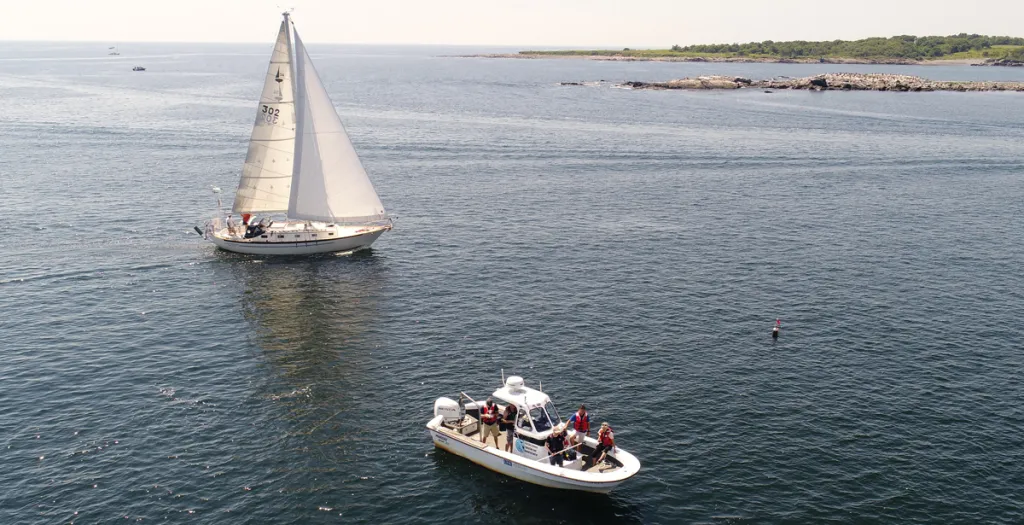
Why UNE for Your Degree in Marine Sciences
- Live and learn on the coast of Maine — just steps from the ocean
- Amazing facilities, from lab technology and aquariums in our Arthur P. Girard Marine Science Center, to our three research vessels and University-owned, private island
- Join a community of students and faculty who share a passion for the sea
- Participate in real research with faculty, on the water and in the lab
- UNE’s regional and national partnerships create opportunities for exciting internships in every aspect of marine science
- UNE is ranked nationally in the top 10 colleges for Marine Sciences
Flexible Foundation for Your Marine Career
The first-year curriculum of UNE’s B.S. in Marine Sciences degree program sets the foundation for other marine majors. You can launch your college career with this major, knowing that UNE faculty will mentor you in changing to another marine major in a way that keeps you on track.
Explore the UNE Marine Sciences Community
What Will You Study? Marine Sciences Degree Curriculum Overview
Examples of Available Courses
The following are just some examples of the exciting courses that the Marine Sciences major offers:
- Underwater Robotics
- Experimental Animal Physiology
- Biology of Sharks, Skates, and Rays
- Marine Mammal Policy
- The Scientific Basis for Global Climate Change
- Polar Biology
- Oceanography
Marine Sciences Degree Tracks
As a Marine Sciences degree seeker, you may choose one of two tracks:
- The Marine Biology track focuses on marine organisms and the ecosystems upon which they depend.
- The Oceanography track focuses on the physical, chemical, and geological basis of biological life in the ocean.
Curriculum
Marine Biology Concentration
| Nor’easter Core Requirements | Credits |
|---|---|
| Total Credits | 40 |
| Marine Biology Concentration Required Courses | Credits |
|---|---|
| CHE 110/110L – General Chemistry I w/Lab | 4 – Fulfills Scientific Method Core |
| CHE 111/111L – General Chemistry II w/Lab | 4 |
| MAR 105/105L – Introduction to Ecol/Evol of Marine Organisms w/Lab | 4 |
| MAR 106/106L – Introduction to Cell/Molec of Marine Organisms w/Lab | 4 |
| MAR 250/250L – Marine Biology w/Lab | 4 |
| MAR 270/270L – Oceanography w/Lab | 4 |
| MAR 325 – Marine Science Speaker Series | 1 |
| MAT 150 – Statistics for Life Sciences | 3 – Fulfills Quantitative Reasoning Core |
| MAT 190 – Calculus I | 4 |
| PHY 110 – General Physics I w/Lab | 4 |
| PHY 111 - General Physics II w/Lab | 4 |
| One (1) MAR 400-level course* | 3 |
| One (1) Cellular and Molecular Area Course | 3–4 |
| One (1) Organismal Area Course | 3–4 |
| One (1) Physiological Area Course | 3–4 |
| One (1) Process Area Course | 3–4 |
| Eight (8) Credits of Marine Science Electives | 8 |
| Total Credits | 63–67 |
| Open Electives (as needed to reach 120 credits) | Variable |
| Minimum Total Required Credits | 120 |
|---|
*MAR 400-level may be fulfilled by BIO 422 – Marine Biology Topics: Coral Reefs with lab. MAR 410 and MAR 495 cannot be used for this requirement.
Oceanography Concentration
| Nor’easter Core Requirements | Credits |
|---|---|
| Total Credits | 40 |
| Oceanography Concentration Required Courses | Credits |
|---|---|
| CHE 110/110L – General Chemistry I w/Lab | 4 – Fulfills Scientific Method Core |
| CHE 111/111L – General Chemistry II w/Lab | 4 |
| CHE 201/201L – Organic Chemistry I w/Lab | 4 |
| CHE 202/202L – Organic Chemistry II w/Lab or CHE 310/310L – Fundamentals of Biochemistry w/Lab | 4 |
| MAR 105/105L – Introduction to Ecol/Evol of Marine Organisms w/Lab | 4 |
| MAR 106/106L – Introduction to Cell/Molec of Marine Organisms w/Lab | 4 |
| MAR 250/250L – Marine Biology w/Lab | 4 |
| MAR 270/270L – Oceanography w/Lab | 4 |
| MAR 325 – Marine Science Speaker Series | 1 |
| MAR 366 – Advanced Oceanography I: Biological & Geological Oceanography | 3 |
| MAR 368 – Advanced Oceanography II: Physical & Chemical Oceanography | 3 |
| MAT 150 – Statistics for Life Sciences | 3 – Fulfills Quantitative Reasoning Core |
| MAT 190 – Calculus I | 4 |
| MAT 195 – Calculus II | 4 |
| MAT 225 – Computer Programming w/MATLAB | 3 |
| PHY 110 – General Physics I w/Lab | 4 |
| PHY 111 – General Physics II w/Lab | 4 |
| One (1) 400-level MAR course* | 3 |
| Total Credits | 64 |
| Open Electives (as needed to reach 120 credits) | Variable |
| Minimum Total Required Credits | 120 |
|---|
*MAR 400-level may be fulfilled by BIO 422 – Marine Biology Topics: Coral Reefs with lab. MAR 410 and MAR 495 cannot be used for this requirement.
Area Courses
| Organismal Biology Area Courses | Credits |
|---|---|
| BIO 222/222L – Techniques in Finfish and Shellfish Culture w/Lab | 4 |
| BIO 223/223L – Health, Nutrition, and Feeding of Cultured Organism w/Lab | 4 |
| BIO 234/234L – Environmental Microbiology w/Lab | 4 |
| BIO 330/330L – Comparative Vertebrate Anatomy w/Lab | 4 |
| BIO 422/422L – Marine Biology Topics: Coral Reefs w/Lab | 4 |
| MAR 312/312L – Plankton w/Lab | 4 |
| MAR 320/320L – Invertebrate Zoology w/Lab | 4 |
| MAR 331/331L – Biology of Fishes w/Lab | 4 |
| MAR 355/355L – Biology of Marine Mammals w/Lab | 4 |
| MAR 375/375L – Biology of Sharks, Skates, and Rays w/Lab | 4 |
| MAR 376 – Biology of Sharks, Skates and Rays | 3 |
| MAR 452/452L – Natural History and Evolution of Galapagos Fauna w/Lab | 4 |
| Process Area Courses | Credits |
|---|---|
| MAR 335/335L – Animal/Behavioral Ecology w/Lab | 4 |
| MAR 350/350L – Marine Ecology w/Lab | 4 |
| MAR 428 – Marine Conservation | 3 |
| MAR 432/432L – Fisheries Biology w/Lab | 4 |
| Physiology Area Courses | Credits |
|---|---|
| BIO 322 – Comparative Animal Physiology | 3 |
| BIO/MAR 421/421L – Physiological Ecology of Fishes w/Lab | 4 |
| MAR 380 – Experimental Animal Physiology | 4 |
| Cell and Molecular Area Course | Credits |
|---|---|
| MAR 220/220L – Cellular and Molecular Approaches in Marine Science w/Lab | 4 |
Electives
| Marine Electives | Credits |
|---|---|
| BIO 221 – Principles of Aquaculture | 3 |
| BIO 222/222L – Finfish/Shellfish Culture Tech w/Lab | 4 |
| BIO 223/223L – Hlth, Nutr, Feed Cultured Org w/Lab | 4 |
| BIO 323/323L – Aquarium Science and Operation w/Lab | 4 |
| BIO 422/422L – Marine Biology Topics: Coral Reefs w/Lab | 4 |
| Any course with a CHE prefix (200-level or above) | 3–5 |
| Any course with a GIS prefix | 3–4 |
| Any course with a MAF prefix | 3 |
| Any course with a MAR prefix (200-level or above) | 3–4 |
Please note: While some courses can fulfill both core and program requirements, the credits earned do not count twice towards the minimum total required credits for the degree.
Students wishing to pursue teacher certification in Life Science can complete a double major with Marine Science and Middle and Secondary Education or a major in Middle and Secondary Education and a concentration in Marine Science. For more information, see the Middle and Secondary Education catalog page.
Students in this major can participate in the pre-health graduate school preparation tracks.
To learn more about the program visit the Academic Catalog.
Double Major in Marine Sciences and Applied Mathematics
The Marine Sciences and Applied Mathematics double major program gives you the opportunity to earn two degrees in four years: a B.S. in Marine Sciences and a B.S. in Applied Mathematics. You’ll learn computer-based mathematical modeling and statistical analysis to address such problems as managing fish populations. The double major will position you for a variety of careers in fields like marine resource evaluation and sustainability, species population dynamics, and data systems management.
You'll spend the first two years completing fundamental math and marine science coursework, leading to an applied student research project in your senior year.
Study Marine Sciences on the Coast of Maine
Career Paths for Marine Sciences Grads
With the knowledge you gain from coursework, the critical thinking skills you develop through research, and the life skills you acquire from internships, you’ll be well on your way to an exciting career in the marine sciences.
Our graduates have pursued many fascinating careers, including:
- Laboratory Technician
- Fisheries Observer
- Marine Biology or Oceanography Researcher
- Animal Caretaker at Zoos and Aquariums
- Environmental Educator
- Animal Trainer
- Conservation Advocate
- Natural Resource Manager
- Veterinarian
- Commercial Diver
Marine Biology Degree Career Advising
Whether you have a specific career goal in mind or a vague idea of the field that interests you, Career Advising is here to help you plan your next step.
Explore Our Marine Science facilities
Beyond our close-knit community of students and world-class faculty who share a passion for marine ecosystems, small class sizes, and student-centered research and education communities, our incredible facilities help us rank as one of the best schools for marine biology.
Experiential Learning in Marine Sciences
Marine Sciences offers constant hands-on interaction in a variety of marine ecosystems and environments from the watershed to the river, from the estuary to the ocean. Through internships, field research, and experiential learning, you don’t just learn marine science — you do marine science.
Internships in Marine Sciences
Students can pursue a wide array of enriching internship opportunities, enabling you to study ocean life at institutions including:
- National Oceanic and Atmospheric Administration (NOAA)
- Gulf of Maine Research Institute
- New England Aquarium
- Bigelow Laboratory for Ocean Sciences
- Various Aquaculture Farms and Fisheries
- Wells National Estuarine Reserve
Marine Biology Research on the Maine Coast
Join Marine Sciences student Andrew Davidson for seine netting research on the Gulf of Maine.
Shark Detection Buoy Deployment in Maine
Join UNE Marine Science faculty and students as they deploy a real-time shark detection buoy in Saco Bay.
Research Opportunities in Marine Sciences
Undergraduate research is an essential part of our programs no matter which major you choose. All students conduct research in the field through their regular coursework beginning in their freshman year, with additional opportunities to gain experience through faculty labs and multi-institutional initiatives.
Research Fellowships in Marine Sciences
In addition to lab classes and faculty lab positions, UNE provides pathways for students to obtain research experience through fellowships from partners and programs including Pratt & Whitney, Bristol Seafood, SEANET, and the Summer Undergraduate Research Experience.
Marine Sciences Research Areas
The field of Marine Science is as broad and diverse as the vast oceans that cover most of our planet. At UNE, we touch upon all facets of marine science with special focuses in the following areas of research.
Applied Marine Technology
Applied marine technology is a crucial marine programs research area that cuts across all others. Robotics, research vessels, remote and autonomous underwater vehicles, environmental monitoring, and modeling are all vital tools that enable modern marine research to occur. Researchers in this area are interested in innovations in and novel applications for marine technology.
Part of our dedication to experiential learning includes providing opportunities to garner real-world skills that make you sought after in the job market and graduate education institutions. A shining example of this is our association with Aquatic Animal Life Support Operators (AALSO). AALSO is a 501 c6 nonprofit organization that focuses on the education and training of aquatic life support operators around the world. AALSO members are those behind the scenes at research institutions and large public aquariums around the world who design, construct, and maintain large aquatic husbandry systems. AALSO provides professional credentialing and proficiency certifications that carry real weight in the industry. UNE is one of only two academic institutions who have been approved by AALSO to administer these tests to our students. Meaning you can walk out the door with a degree in hand, and a professional industry certification in your back pocket.
Researchers:
Boats, for obvious reasons, are important to marine research. At UNE we are fortunate enough to have a fleet of research and education vessels [ATS1] from 18’ to 32’ that are utilized in our programs. Add to this our faculty and professional staff with professional vessel operation credentials and experience operating and conducting science aboard ships and research vessels all over the world — and UNE Marine programs are well suited to help you gain the important technical knowledge needed to be proficient and safe both operating and conducting research at sea.
Researchers: Tim Arienti
The oceans cover more than 70% of the planet. The interconnectivity of life and ecosystems in the sea are incredibly complex, and distinctly linked to both the land and our atmosphere. Such complexity is nearly impossible to understand without the powerful predictive capacities of computer models. These models, based on data collected in the field, from satellites, the geological record, and elsewhere, are used to forecast (and hind-cast) everything from fish populations and food webs to ocean circulation, hurricanes, and climate change.
Researchers:
Ocean robotics and smart technology — in the form of underwater drones, manned submersibles, water quality sensors, oceanographic buoys, and camera systems — is a rapidly growing, and increasingly important marine field. In the age of technology, these tools are becoming vital components in enabling cutting-edge marine research across the board.
Researchers:
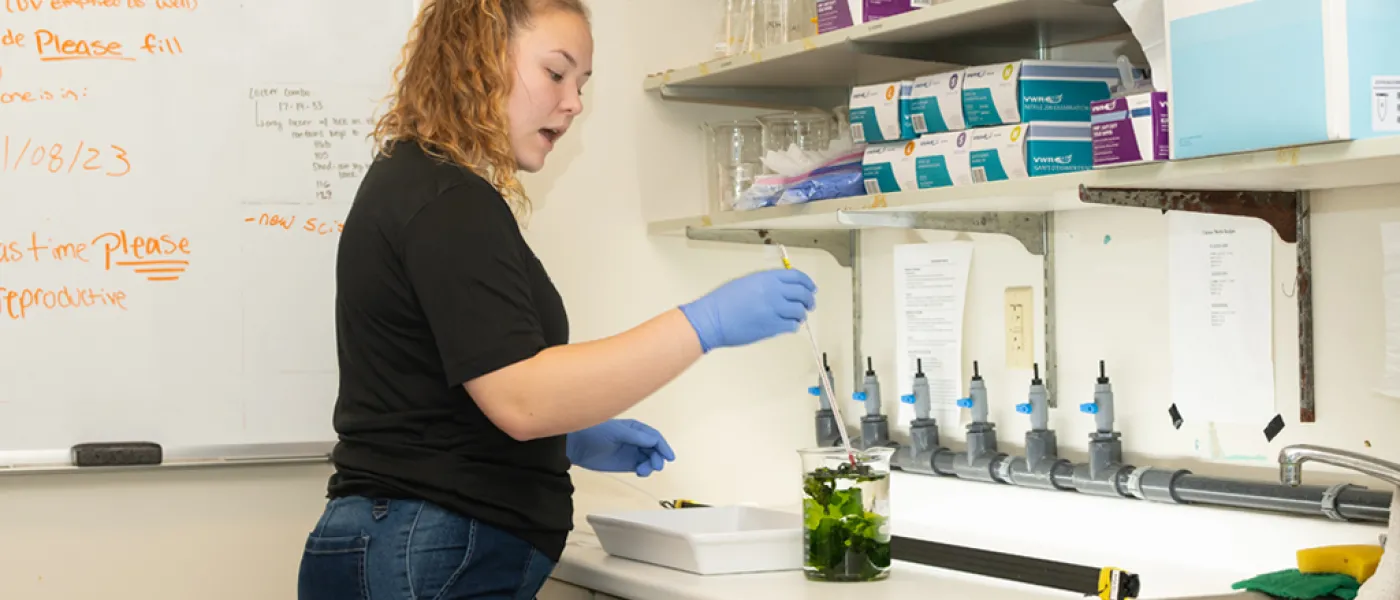
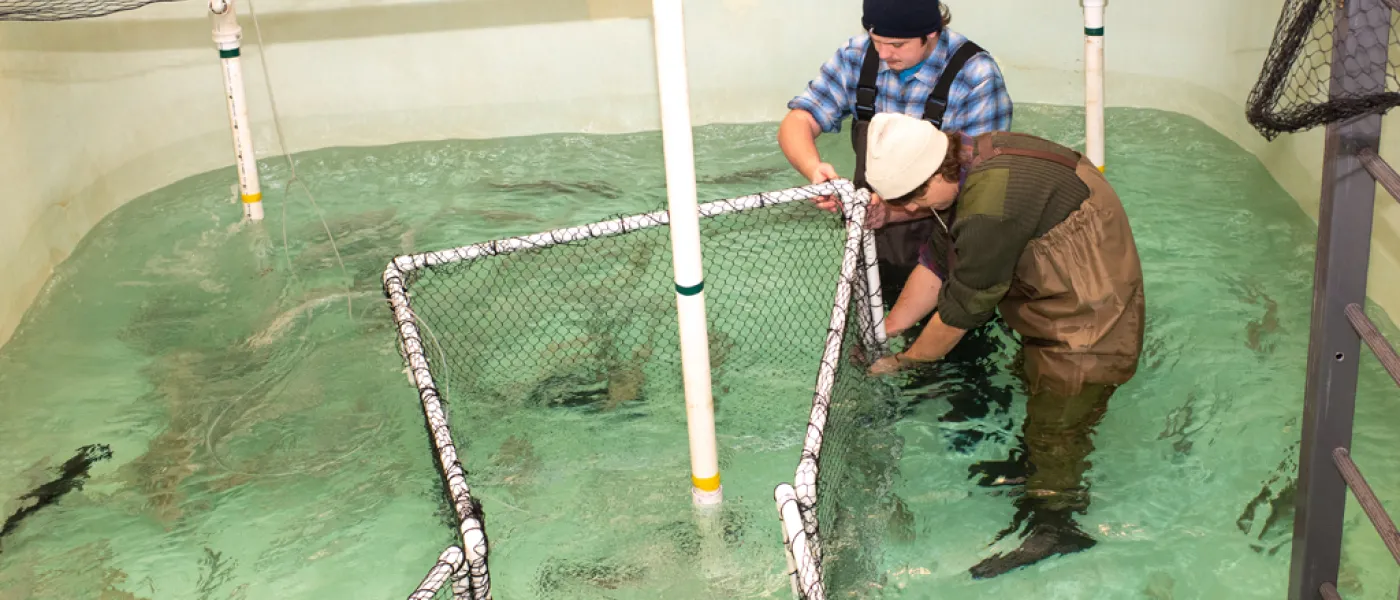
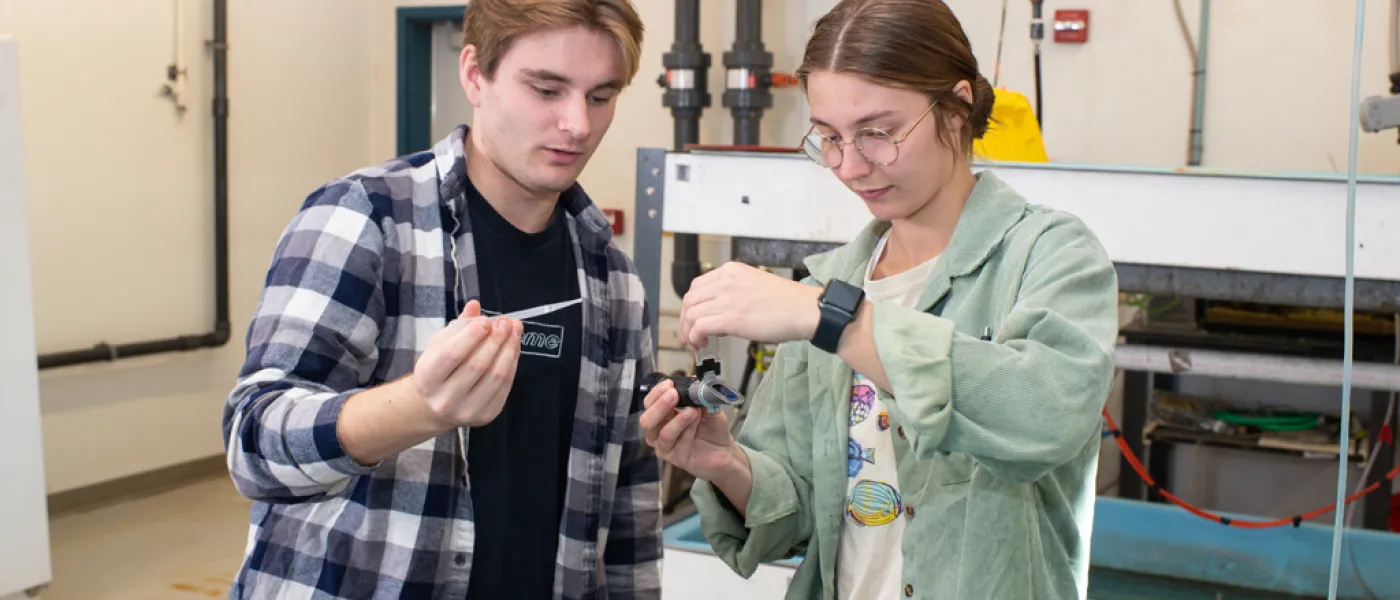
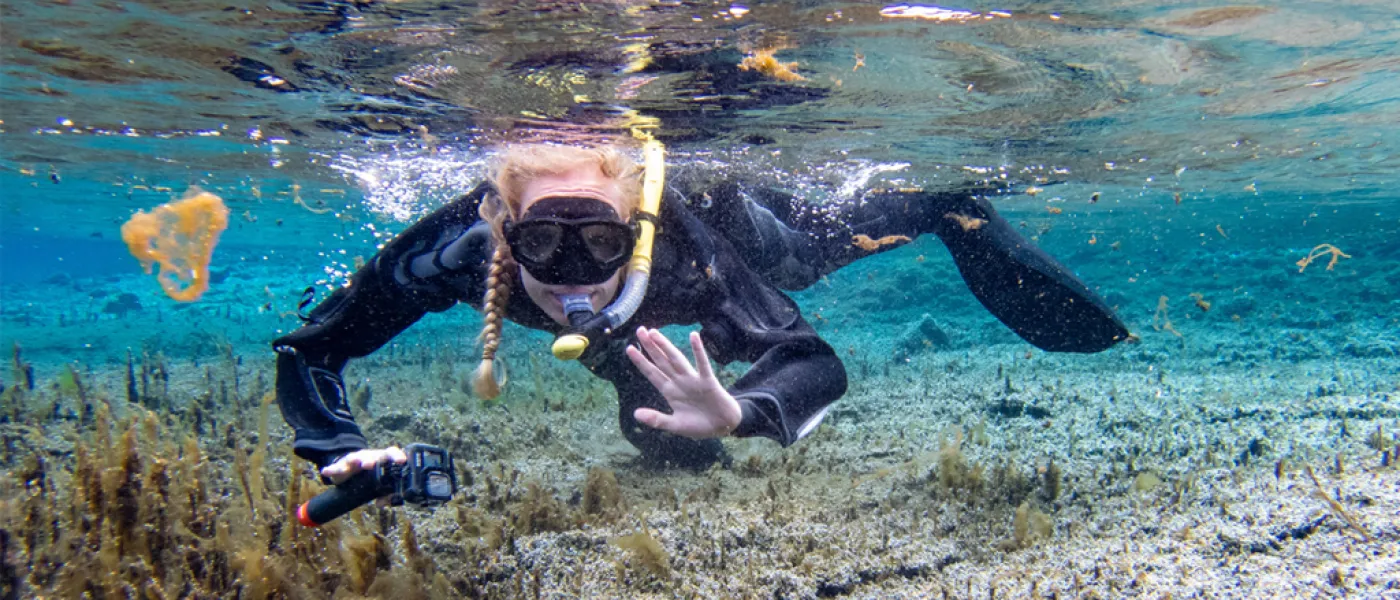
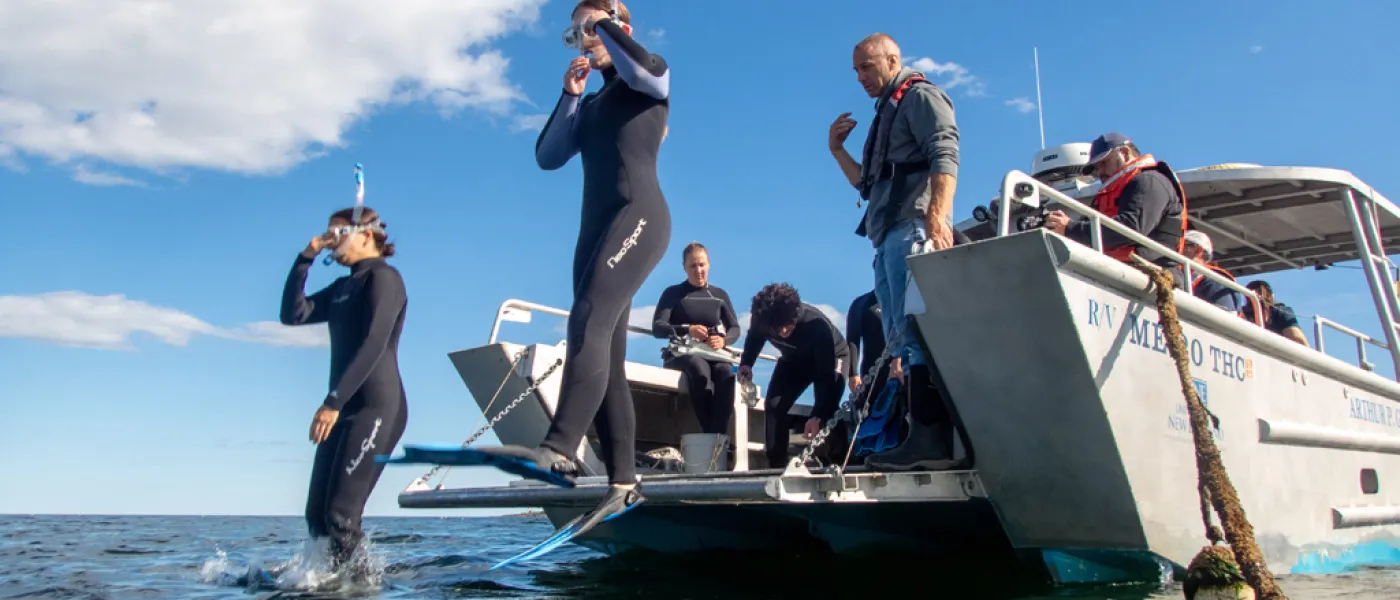
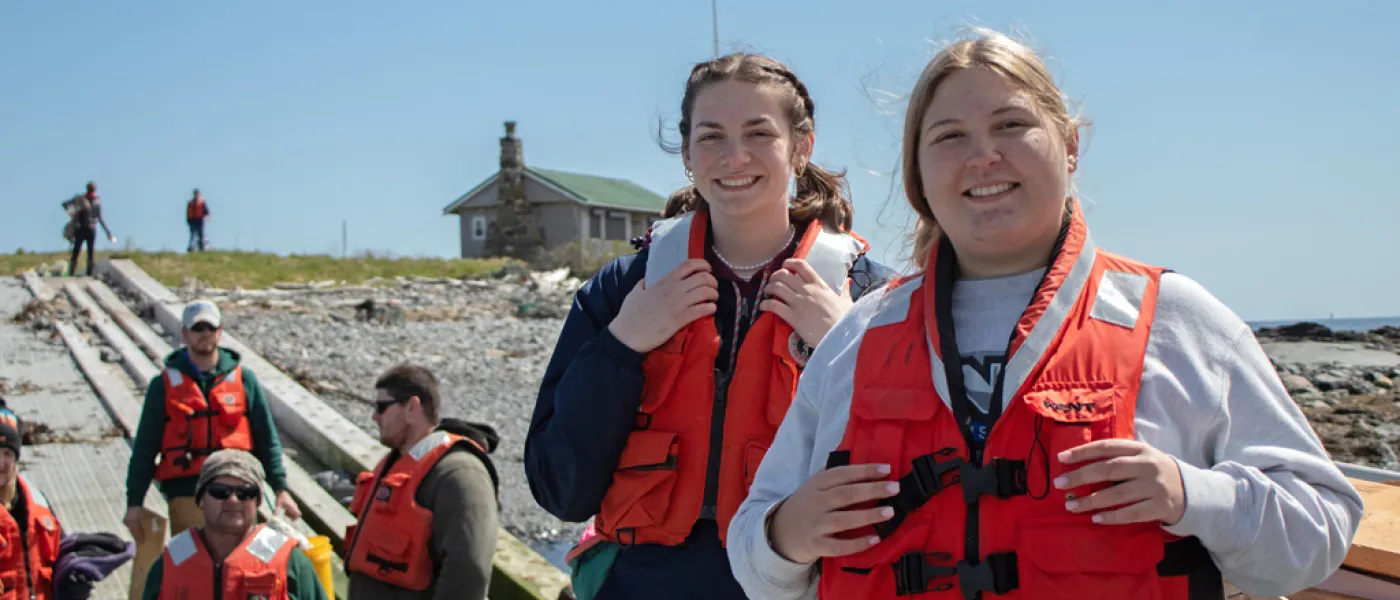
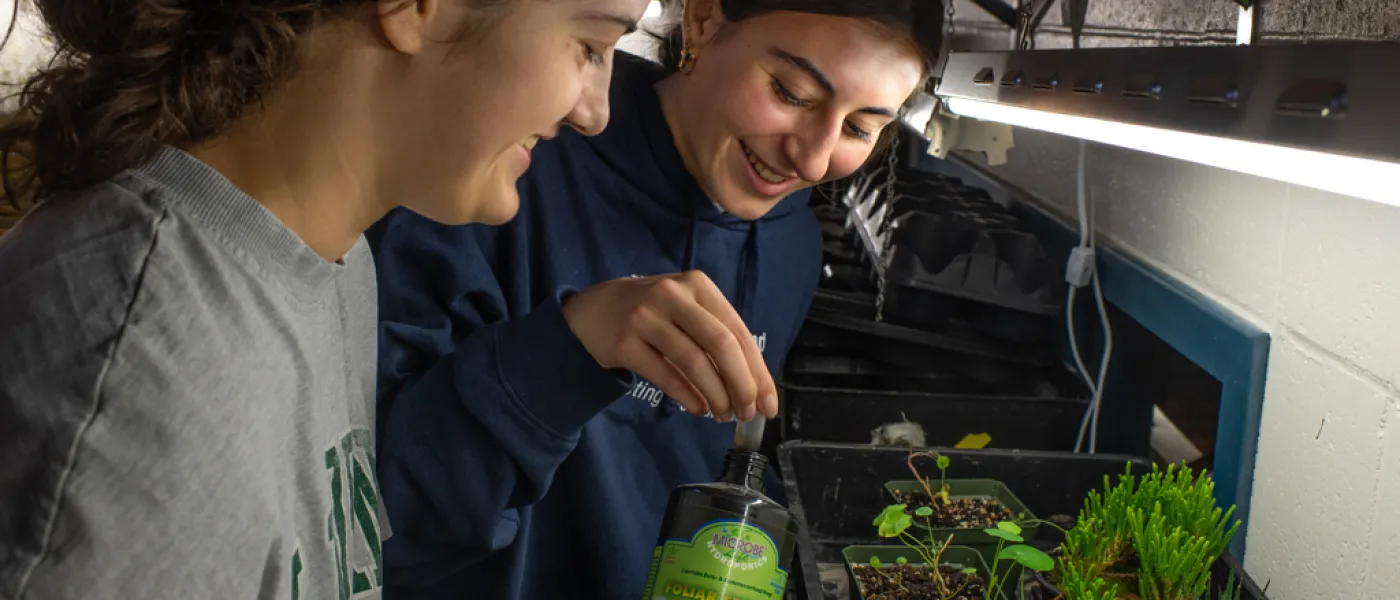
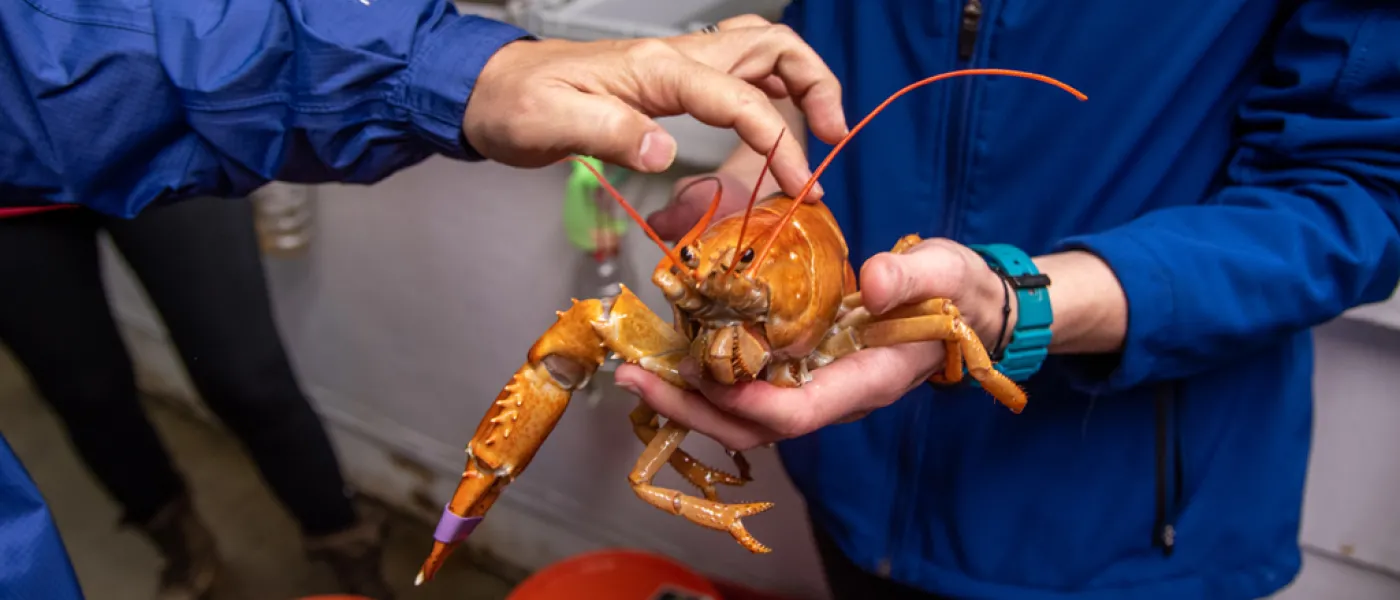
Food from the Ocean
With a global human population headed towards 10 billion by 2050, understanding the interactions between the ocean and what we eat is more important than ever. Our location on the coast of Maine has a deep heritage and connections to the people and communities who have harvested food from the sea, and the ecosystems that provide it. We have robust research and education programs in this focus area including fisheries science and management, ecological aquaculture, marine entrepreneurship, migration of highly migratory species, and food web ecology.
Fisheries science and management are both distinct disciplines that are highly interwoven. Fisheries science creates the knowledge and data used in order for fisheries management to make the best possible policies to manage a fishery. The policies and the priorities set forth by management then in turn creates the framework for fisheries science to design and conduct research. At UNE, we have researchers with expertise on both sides of this important coin.
Researchers: Susan Farady
Globally, the saltwater ornamental fish and aquarium industry is valued at $15 billion, resulting in the importation of more than 400 fish species. And yet, only 10% of these fish are cultured. Ornamental aquaculture is the application of aquaculture techniques and protocols to produce fish and other organisms used for decorative purposes. This practice can help greatly reduce pressure on wild fish populations and increase the sustainability of a hobby growing rapidly on a global scale.
Researchers:
The global human population is projected to be more than 10 billion people by 2050. That is a lot of mouths to feed. And yet, while the oceans cover more than 70% of our planet, only 2% of food production (including all fisheries and ocean farms) comes from the sea. In the future there will be by necessity, increased pressure on global oceans to produce food. Much of this will come from ocean-farms producing not only fish, but shellfish, seaweeds, and other marine foods. Researchers in our Marine programs study the entire suite of issues pertaining to seafood and aquaculture.
Researchers:
Biology of Marine Organisms
Our Marine Programs faculty and professional staff conduct a wide range of research in the areas of biology and ecology of marine organisms. This research area is very broad and ranges from marine genetics to the migration patterns of large animals like sharks, seals, and whales. From seaweed to sharks — plankton to pinnipeds (seals!) our team covers it all.
Food web dynamics focuses on how energy moves through organisms in an ecosystem through primary productivity (photosynthesis) and consumers. Researchers in our Marine programs study these interactions to create a “who’s eating who” web of connections between organisms in an ecosystem.
Researchers: Carrie Byron, Ph.D.
Invasive species are any species introduced to an ecosystem in which they are not native that then go on to cause disruption or harm to the functioning of that ecosystem. Marine organisms are adept at hitching rides in ballast water of ships, through hitchhiking on marine debris, or even through deliberate introduction. Researchers at UNE study these organisms and their ecological interactions and impacts in the Gulf of Maine and beyond.
Researchers: Markus Frederich, Ph.D.
There are more than 20,000 species of marine and fresh water bony fish on the planet, while mollusks alone (snails, bivalves, etc.) comprise more than 85,000 known species. Of all the expansive biodiversity contained within our oceans, the vast majority is contained within the marine invertebrates. With so much diversity, the opportunities for research in marine invertebrates are almost inexhaustible.
Researchers:
Life in the sea poses challenges unique to oceanic organisms, especially the smallest of those (microorganisms). By virtue of being immersed in water, they are at the mercy of the tides, currents, chemistry, and geology of the sea. Oceanography is the study of these physical properties and processes in the ocean — physical, chemical, and geological. Oceanography researchers at UNE study how these oceanographic components interact with each other and affect life in the sea.
Researchers:
With few exceptions, marine microbes and plankton form the base of the marine food web. Small but mighty, the plankton are the fuel for life in the sea. Researchers within our Marine programs study many facets of the biology, ecology, and even chemistry of this important and diverse group of organisms.
Researchers:
The largest organisms in an ecosystem are often sentinels of ecosystem health and serve key roles in the health and balance of our oceans. UNE researchers study the biology and ecology of sharks and marine mammals in the Gulf of Maine and across the globe.
Human Impacts on the Ocean
Evidence of human impact on the ocean is everywhere, not just limited to our coastal oceans. Plastics and chemicals have been documented from the deepest depths of the global seas, while climate change affects all aspects of the ocean. More and more, we cannot separate studying the natural ocean environment apart from human influence. Fisheries, microplastics, policy, pollution, conservation, and restoration all fall into this category. UNE Marine Programs faculty, professional staff, and students are focused on research and solutions across the spectrum of human influence on our seas.
Our climate is changing — rapidly. Its impacts are felt broadly across our planet, especially our oceans, which play crucial roles in mediating, moderating, and shaping the global impacts of accelerating planetary change. This is exemplified in our own backyard, where the Gulf of Maine is warming faster than 90% of all other ocean waters. Rather than a discrete area of study, climate change research at UNE Marine Programs is more of an umbrella. One of the most important planetary challenges of our time, climate change research is integrated by necessity into almost all of our Marine Programs research and scholarship areas of focus.
Researchers:
Not all human impacts on the sea are negative. Human interventions in the forms of conservation and restoration science and policies can produce real and impactful improvement in the marine environment. Ecosystem and habitat restoration, invasive species mitigation and management and ocean advocacy are all part of UNE Marine Programs.
Researchers:
In many ways, the ocean represents a vast resource with the potential for creating economic growth in a sustainable or even restorative fashion. Opportunities here include sustainable fisheries and aquaculture ventures, ocean robotics, sensors and remote sensing, shipping, value-added marine-derived products such as cosmetics and nutraceuticals, even textiles and fashion.
Researchers: Jeri Fox
The ocean is downstream of everything and given a long enough period of time, everything ends up in the ocean. Marine pollution impacts our oceans through many pathways and in many forms: excess nutrients and runoff from urban and agricultural lands, bacteria from our wastewater, chemicals from our industries, and plastics from, well, everywhere…are just a few examples. Researchers in our Marine programs look into how the pollutants impact marine organisms and ecosystems, as well as techniques to mitigate and policies to prevent pollution from entering the ocean.
Researchers:
Global Education in Marine Sciences
In addition to opportunities to spend a semester abroad in Tangier, Morocco or Seville, Spain for the same cost as studying at UNE's Maine campuses, you may choose to enroll in one of our marine sciences-related travel courses. To enroll in these courses and learn more, visit the Global Education Program website.
Interested in studying abroad? Make a plan with your advisor.
Belize
BIO 421: Marine Topics: Coral Reef Studies
This course presents an in-depth study of the biology and taxonomy of corals while examining the ecology of the coral reef system and the future of reefs.
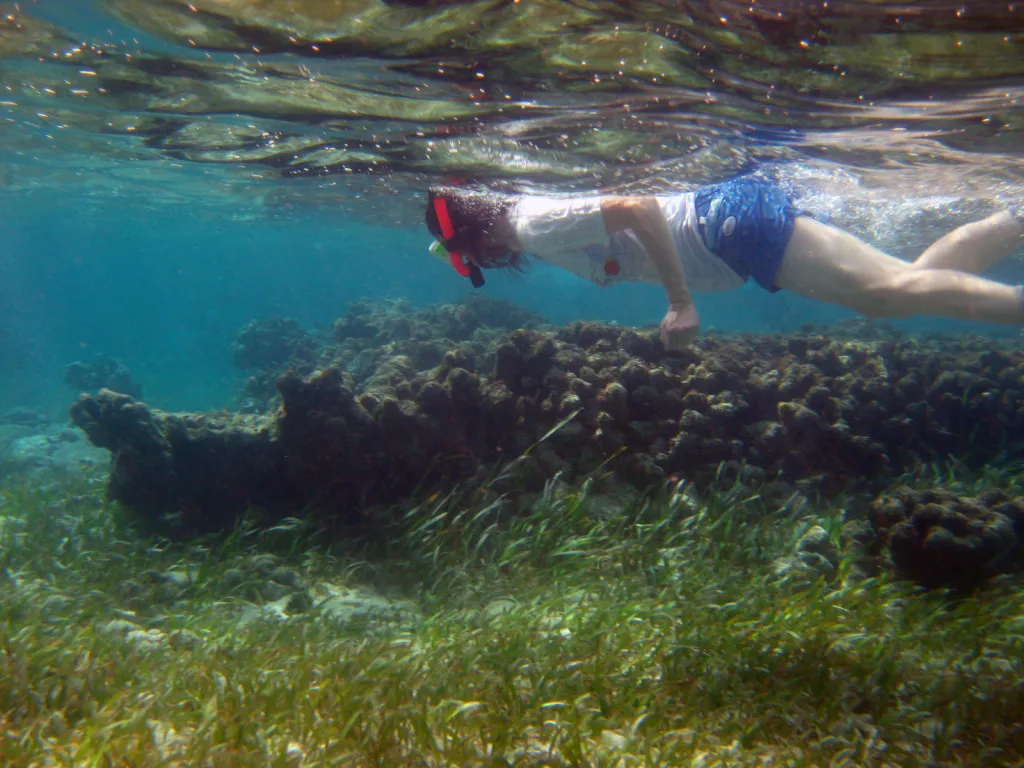
Galápagos
MAR 451: Natural History and Evolution of the Galapagos Fauna
This course is designed to familiarize you with the biota of the Galapagos Islands, island history, ecology, and the behavior and evolution of the islands' animals.
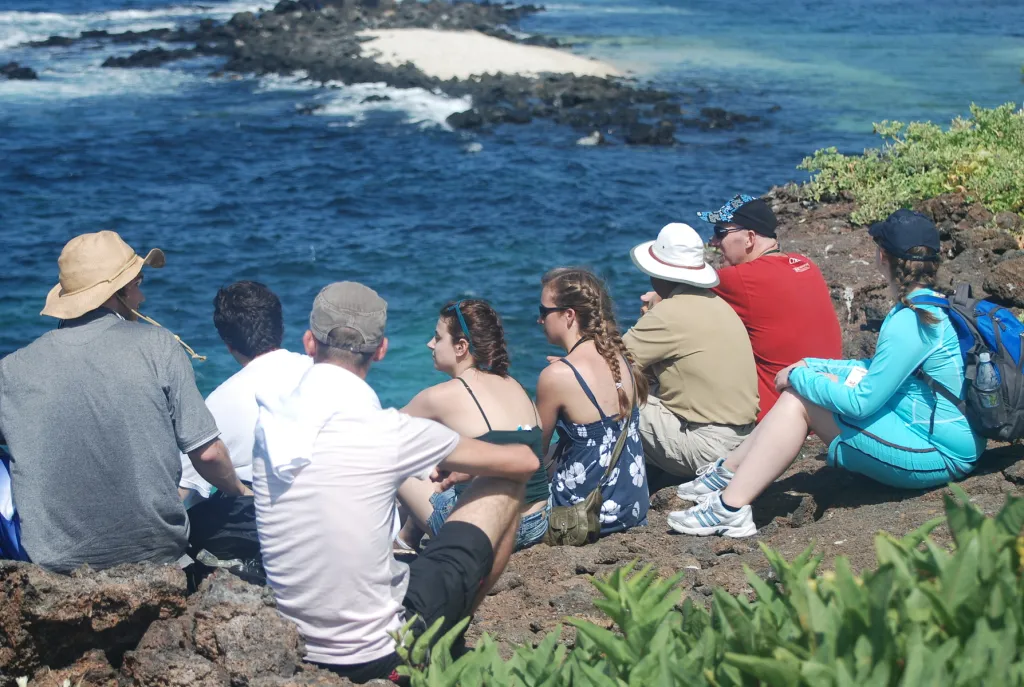
Iceland
Semester-Long Study Abroad Program
Spend a semester abroad in Akureyri on the northeast coast of Iceland. You'll be studying in Iceland's second-largest urban area surrounded by mountains and fjords.
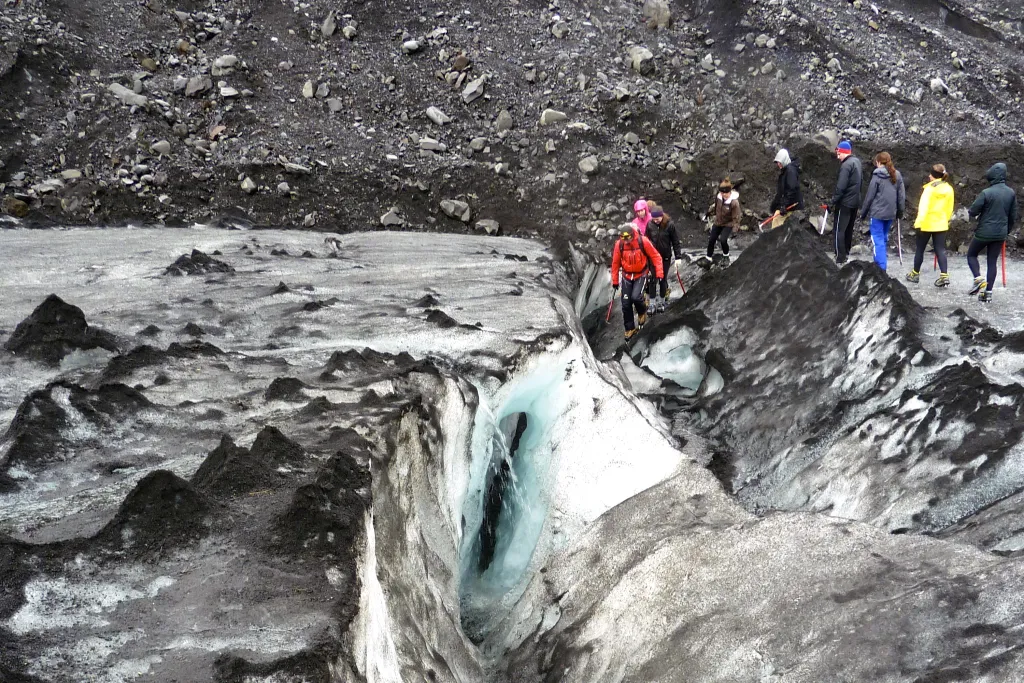
Panama
BIO 421: Conservation and Ecology of a Caribbean Island
This course covers topics in the history and geology of the Caribbean, including terrestrial, island, and marine biodiversity, plus the ecology and evolution of populations.

UNE North
The Institute for North Atlantic Studies of the University of New England is an education and research leader for Maine connected to the North Atlantic/Arctic region grounded in the United Nations Sustainable Development Goals and built to support local to global collaborative approaches to shared challenges and opportunities.
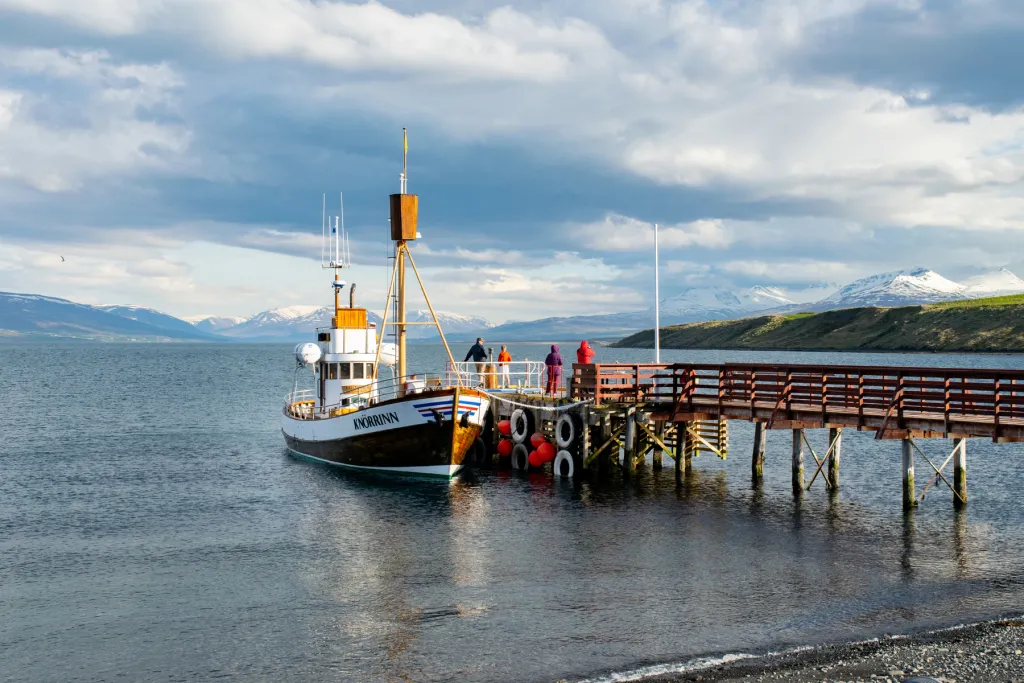
Apply Today
Ready to begin your future and study ocean life in UNE’s Bachelor of Science in Marine Sciences? Get started today!
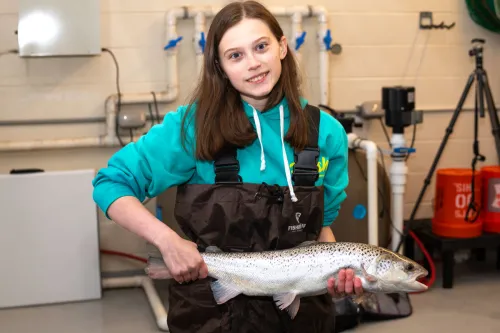
Bachelor of Science in Marine Sciences FAQ
What is marine science?
Marine sciences delve into the vast and captivating world of oceans and their interactions with the rest of our planet. It's not just about studying fish and coral reefs; it's about unraveling the complex web of biological, physical, chemical, and geological processes that shape everything from tiny plankton to giant whales and influence the very health of our planet.
Core areas of inquiry include:
- Biological oceanography: Understanding the abundance, distribution, and interactions of marine organisms across different ecosystems.
- Chemical oceanography: Studying the chemical composition of seawater, its role in nutrient cycles, and the impact of pollutants.
- Physical oceanography: Analyzing ocean currents, waves, tides, and the ocean's role in influencing global climate patterns.
- Geological oceanography: Investigating the ocean floor, underwater landscapes, and the geological processes shaping them.
- Marine ecology: Examining the relationships between marine organisms and their environment, including food webs, competition, and adaptation.
- Marine policy and law: Exploring the legal frameworks governing human activities at sea, focusing on sustainable resource use and conservation.
Learn how you can earn your B.S. in Marine Science along the coast of Maine at UNE
What will I learn in a marine sciences degree program?
Marine sciences draw from various disciplines like biology, chemistry, physics, geology, oceanography, meteorology, and even economics and law, providing a holistic understanding of the ocean.
In a marine sciences degree program, you will focus on human-ocean interactions. You will not only analyze the ocean itself but also examine the impact of human activities on marine ecosystems and vice versa.
Marine scientists study both large-scale phenomena like global currents and climate change, as well as local issues like coastal pollution and resource management.
Skills you can expect to gain in a marine sciences degree program include:
- Critical thinking and problem-solving: Analyze complex marine issues, identify root causes, and develop solutions for challenges like pollution, overfishing, and climate change.
- Data analysis and research: Collect, analyze, and interpret data from various sources like field research, sensors, and satellite imagery.
- Communication and collaboration: Effectively communicate marine science findings to diverse audiences and collaborate with researchers, policymakers, and stakeholders.
- Project management and implementation: Manage research projects, analyze results, and translate findings into practical solutions for real-world challenges.
- Lifelong learning and adaptability: Stay updated on new discoveries and advancements in the field, adapting to evolving challenges and technologies.
As a Marine Science student at UNE, you will be introduced to all facets of marine ecosystems in oceans, freshwater, and estuaries. Plus, you’ll have the opportunity to work hands-on with scientific and nautical equipment – gaining valuable experience to translate over to a career.
The following are just some examples of the exciting courses that UNE’s Marine Sciences major offers:
- Underwater Robotics
- Experimental Animal Physiology
- Biology of Sharks, Skates, and Rays
- Marine Mammal Policy
- The Scientific Basis for Global Climate Change
- Polar Biology
- Oceanography
What types of careers exist for marine scientists?
Marine sciences offer a rewarding and impactful career path for individuals passionate about the ocean and its future. By understanding the intricate workings of this vast and vital resource, we can protect its health, conserve its biodiversity, and ensure its ability to sustain both the planet and ourselves for generations to come. Specific career paths include:
- Research and academia: Conduct research, teach, and contribute to scientific knowledge about marine ecosystems and challenges.
- Government agencies and NGOs: Work on marine policy, regulation, conservation initiatives, and ocean governance.
- Private sector: Work in sustainable marine industries, ocean technology companies, or consulting firms.
- Education and outreach: Educate the public about marine issues and promote sustainable practices.
- Marine law and advocacy: Work on environmental law, maritime law, and advocate for marine conservation and sustainable use.
With the knowledge you gain from coursework, the critical thinking skills you develop through research, and the life skills you acquire from internships, you’ll be well on your way to an exciting career in the marine sciences with a degree from UNE.
UNE B.S. in Marine Sciences graduates have pursued many fascinating careers, including:
- Laboratory Technician
- Fisheries Observer
- Marine Biology or Oceanography Researcher
- Animal Caretaker at Zoos and Aquariums
- Environmental Educator
- Animal Trainer
- Conservation Advocate
- Natural Resource Manager
- Veterinarian
- Commercial Diver
Whether you have a specific career goal in mind or a vague idea of the field that interests you, UNE’s Career Advising is here to help you plan your next step.
How much money do marine scientists typically make?
The average salary for a marine scientist in the United States is $76,640, according to the January 2024 report from Zippia. Salaries will depend on where you work and your specific marine science job specialty.
What is the best marine sciences degree program for me?
Take a look at the marine science curriculum and see if it includes dynamic courses and a location where you can learn and explore on the ocean. This list can help you decide which is the best marine science degree program for you:
Faculty
Decide if marine science faculty expertise aligns with your specific interests and career goals. Also consider reviewing faculty research and professional backgrounds to determine the best fit for your educational journey.
UNE provides world-class, expert marine science faculty that mentor and encourage you throughout your academic career at UNE. As a marine science student, you will participate in real research with faculty, on the water and in the lab.
Meet faculty and professional staff in UNE's School of Marine and Environmental Programs
Curriculum
Review the marine sciences degree program curriculum to see if it seems like a good fit for you and includes a hands-on approach to your undergraduate career.
As Marine Sciences student at UNE, you may choose one of two tracks:
- Marine Biology track – focuses on marine organisms and the ecosystems upon which they depend
- Oceanography track – focuses on the physical, chemical, and geological basis of biological life in the ocean
The following are just some examples of the exciting courses that the UNE’s Marine Sciences major offers:
- Underwater Robotics
- Experimental Animal Physiology
- Biology of Sharks, Skates, and Rays
- Marine Mammal Policy
- The Scientific Basis for Global Climate Change
- Polar Biology
- Oceanography
Learn more about UNE’s B.S. in Marine Sciences curriculum
Career Goals
Choose a marine sciences degree program that aligns with your career aspirations and goals, including internships. Explore the available resources to help you plan your path forward.
As a marine sciences student at UNE, you will be well prepared for an exciting career across a variety of marine related disciplines. There are several opportunities for our students to gain professional skills by working collaboratively with faculty and partner organizations on marine science projects in southern Maine. Our students are often accepted into competitive local, national, and internship programs.
UNE B.S. in Marine Sciences graduates have pursued many fascinating careers, including:
- Laboratory Technician
- Fisheries Observer
- Marine Biology or Oceanography Researcher
- Animal Caretaker at Zoos and Aquariums
- Environmental Educator
- Animal Trainer
- Conservation Advocate
- Natural Resource Manager
- Veterinarian
- Commercial Diver
UNE Students can benefit from the support of the Academic and Career Advising Center, whether they have a clear career goal or a general interest in a particular field.
Learn more about Career Advising at UNE
Learning Environment
Consider the location and environment that best supports your undergraduate journey as a marine sciences major. At UNE, marine sciences students study ocean life on our coastal campus in Maine, located where the Saco River meets the Atlantic. You will live and study just steps from our cutting-edge Marine Science Center, campus dock, research vessels, and our private island.
UNE’s Marine Science Center offers 27,550 square feet across two floors for teaching, learning, and research. Our tidal pumping system and 550,000-gallon storage tank enable flow-through seawater to be distributed to classrooms and labs, ensuring realistic environmental conditions for research.
UNE's Ocean Clusters, research-education workgroups focused on specific marine topics ranging from aquaculture to phytoplankton, occupy a whole wing of the building, showcasing 4,950 square feet of research space, five internal pools, wet and dry laboratories, offices, and classrooms.
We also encourage UNE marine sciences students to study abroad and learn about marine life and processes in other geographic areas. In addition to opportunities to spend a semester abroad in Tangier, Morocco or Seville, Spain for the same cost as studying at UNE's Maine campuses, you may choose to enroll in one of our marine sciences-related travel courses.
Learn more about study abroad opportunities at UNE
Financial Aid
Consider whether the school you're interested in provides financial aid or scholarships to support your education.
A UNE undergraduate education is affordable. Our tuition is 16% below the average tuition for private universities in New England. Plus, all incoming full-time undergraduate students at UNE will receive Merit Scholarships in amounts from $5,000 to $22,000 per year.
Learn more about grants and scholarships available to students at UNE
